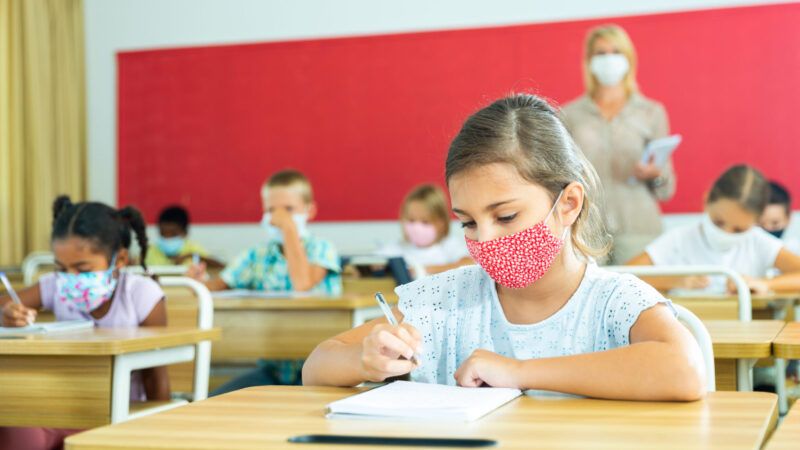Department of Education Will Launch Investigations Targeting States That Banned Schools From Mandating Masks
Not everything potentially beneficial should be mandatory and not everything potentially harmful should be banned. And not every dispute about costs and benefits should be decided by the federal government.

The debate over whether masks will be mandated or banned in public schools will apparently be settled—like a depressing number of issues these days—with the hammer of federal authority.
The Department of Education announced Monday that it would launch civil rights investigations into five states whose governors have banned school districts from imposing mask mandates on students and teachers. The department's Office for Civil Rights says those mandates might "discriminate against students with disabilities who are at heightened risk for severe illness from COVID-19 by preventing them from safely accessing in-person education." So the department sent letters to education officials in Iowa, Oklahoma, South Carolina, Tennessee, and Utah, explaining that prohibiting mask mandates "may be preventing schools…from meeting their legal obligations not to discriminate based on disability."
That is quite a stretch—and yet another pandemic-induced opportunity for the federal government to extend its control over decision-making that has always been left to state and local governments.
In a statement, Secretary of Education Miguel Cardona claimed that his department has the authority to launch these investigations under Section 504 of the Rehabilitation Act of 1973, which prohibits discrimination against people with disabilities in programs that receive federal funding. But, as Reason's Jacob Sullum explained last week, this interpretation of the Rehabilitation Act effectively upgrades the Center for Disease Control's "guidelines" for schools into mandates with the force of law. The legal argument at the basis of these new investigations presupposes that public health officials, working in conjunction with federal education officials, can override decisions made by the heads of America's 13,800-plus school districts.
That's not how Cardona frames it, of course. Because everything has to be rammed through a partisan filter, the Department of Education says it is trying to stop "state leaders" (in all five cases, Republicans) from preventing local schools from taking necessary protective action. But in reality, this is a giant expansion of federal authority over conduct in schools. If successful, Cardona would be paving the way for future education secretaries to mandate whatever policies its collection of experts believe are in the best interest of students, regardless of whether district and state officials agree.
And he would be taking that step over a policy that is a long way from being proven effective. Indeed, many other countries around the world—including the U.K., Ireland, all of Scandinavia, France, the Netherlands, Switzerland, and Italy—do not require masks in classrooms and have not seen a higher rate of COVID outbreaks in schools.
After reviewing COVID data from Florida, New York, and Massachusetts during the 2020–21 school year, Brown University economist Emily Oster and four other researchers reported that "we do not find any correlations with mask mandates" and lower case rates.
While the benefits of in-school masking are thin, the costs rarely get much attention. For one, turning teachers into mask-enforcement officers won't help kids make up for lost classroom time.
"The benefits of masks in preventing serious illness or death from COVID-19 among children are infinitesimally small," argue Neeraj Sood, director of the COVID program at the University of Southern California's Center for Health Policy and Economics, and Jay Bhattacharya, a professor of medicine at Stanford University. "At the same time they are disruptive to learning and communicating in classrooms."
The CDC's numbers suggest that mask mandates are associated with a 20 percent reduction in COVID-19 infection rates. But as Sood and Bhattacharya point out, about 5,000 children in California were diagnosed with COVID-19 during June 2021, which translates to 1,000 infections that could have been prevented with masks. "Given the survival rate among children, mask mandates might prevent one child death in the coming school year, a tiny fraction of the approximately 900 deaths of children 5 to 17 years old in 2019," they write. "If the aim is to save children's lives, other interventions—like enhanced pool safety—would be much more effective."
Ultimately, these cost-benefit decisions should be made by school district officials and, ultimately, by parents. There is little to be gained by letting these decisions be made by federal bureaucrats—or governors—eager to score points in a culture war.
The department's announcement notes that the decision to launch these investigations does not mean that any further actions will be taken. But given what Cardona and President Joe Biden have been saying for months about using federal authority to mandate masks in schools, this is probably best viewed as a beachhead rather than a trial balloon.
It's all incredibly frustrating because, even in states where governors have arguably overstepped their authority to ban schools from imposing mask mandates, there's nothing preventing individual students, teachers, and staff from choosing to wear a mask in school. And those conflicts between governors and school boards are already being worked out in the court system.
As with so much of the debate over masking, everyone seems to have lost sight of the vast space that exists between prohibiting a mandate and banning masks outright. Not everything potentially beneficial should be mandatory and not everything potentially harmful should be banned—yes, even during a pandemic. And not every dispute about costs and benefits should be decided by the federal government.


Show Comments (116)